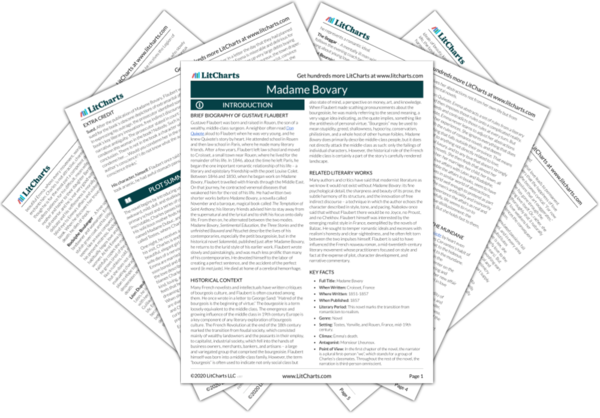Summary
Analysis
The next day, Emma feels confused and desolate. Her feeling of loss resembles her longing for Vaubyessard. In absentia, Léon seems ever more beautiful and marvelous, and she deeply regrets letting him go. Her sorrow becomes her sustaining warmth. But with time, the emotion fades, and she is left more unhappy than ever. She begins to buy expensive clothes and trifles to console herself, and tries to read serious books. She is restless and moody, and develops a tendency for fainting fits.
Emma’s longing for Léon is like her longing for Vaubyessard because both are emotions directed inward; both objects of longing represent a better, happier life for Emma, the achievement of an abstract ideal. When Léon leaves, he is no longer a possibility of pleasure, and Emma finds herself loving him for his own sake. But she is not used to such a selfless devotion, and redirects her energies into more familiar channels.
Themes
One day, when Emma spits blood, Charles writes his mother for advice. The elder Madame Bovary thinks books and idleness are Emma’s trouble, and she cancels Emma’s library subscription.
This scene is a straightforward reference to the book-burning scene in Don Quixote. Charles’ mother seems ignorant, but she is not wrong.
Themes
One day, Emma notices a man in a green velvet coat walking through the square. She overhears his name – Monsieur Rodolphe Boulanger de la Huchette – and concludes that he is a nobleman. He has come to ask Charles to examine his servant, who has been having pains. At the servant’s request, Charles bleeds him. He has asked Justin to hold the bowl, and both young men have some sort of nervous fit. Monsieur Rodolphe watches as Emma gracefully nurses Justin back to consciousness.
Emma and Rodolphe embark on a romance of appearances. Emma likes Rodolphe for his fancy coat and aristocratic name, and Rodolphe likes Emma for good looks and genteel bearing. They form complete opinions of one another based on these impressions, without reference to any of the traits, values, and habits that make us distinct people.
Themes
Rodolphe talks to Emma a little bit afterwards. She tells him that she has never had a fainting fit, and he expresses admiration for her strength. After he leaves, he thinks shrewdly about Emma and her life. He guesses that Charles is clumsy, stupid, and unsatisfying, and that the lovely Emma is longing for some excitement. He thinks he could easily seduce her, though he wonders how to “get rid of her afterwards.” He thinks that he prefers Emma to his current mistress, who is losing her looks. He decides to pursue her.
Rodolphe’s shrewd interpretation of Emma’s life is like a very cursory summary of the novel itself. It is not inaccurate, exactly, but it is missing so much – everything that differentiates Emma from a million other pretty, bored wives. Rodolphe deals in abstractions, like Emma; but his abstractions are as cynical as Emma’s are sentimental.
Themes
Get the entire Madame Bovary LitChart as a printable PDF.













